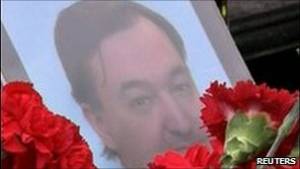Russia announces first charges In prison death of anti-corruption lawyer Sergei Magnitsky
Russian authorities have charged two prison doctors over the death in custody of anti-corruption lawyer Sergei Magnitsky, whose case has become both a rallying cry for rights activists and a major irritant in U.S.-Russian relations.
The charges, announced on Friday by a spokesman for the Russian Investigative Committee, Vladimir Markin, are the first in the case since Russian President Dmitry Medvedev called for an inquiry following the lawyer’s death in November 2009.
Markin said, "In the course of the investigation of the criminal case, a direct cause-and-effect relation was established between Magnitsky’s death and the actions of the doctors at the [Butyrka] pretrial detention facility where he was held."
Doctor Larisa Litvinova was charged with causing death by neglecting her professional duties.
Dmitry Kratov, the deputy head of the jail in charge of medical treatment, was charged with negligence causing involuntary manslaughter.
If convicted, the officials face 3 and 5 years in jail, respectively.
When the Investigative Committee opened its criminal cases against Litvinova and Kratov last month, it said that additional individuals could also be charged in future.
Magnitsky, a 37-year-old lawyer representing the UK-based investment firm Hermitage Capital Management, was arrested in 2008 on fraud and tax evasion. He had recently implicated high-ranking officials from Russia’s Interior Ministry, Federal Security Service, and other offices in a scheme to defraud the government of $230 million.
Magnitsky endured torturous conditions during nearly a year in pretrial detention, during which he was repeatedly denied requests for medical care.
The Moscow Public Oversight Commission, an independent group charged with monitoring human rights in Russian jails, concluded that care had been withheld partly in an effort to get him to withdraw his testimony.
A report on Magnitsky’s death issued by the Kremlin’s human rights council in July said the lawyer had also been severely beaten before he died.
William Browder, the CEO of Hermitage Capital Management, has led an international campaign since Magnitsky’s death to prosecute the officials he says are responsible. He has testified before government officials and rights commissions in the United States and Europe.
He told RFE/RL that the charges brought today are a "good start, " but that prosecutors need to "move up the food chain."
"There are 60 people who played a role, one way or another, in [Magnitsky’s] false arrest, torture, and death, or in the crimes that he blew the whistle on, and so this is two out of 60. [It’s a] good start, but there’s a lot more people -- and a lot more senior people -- that need to be prosecuted before we’re going to be anywhere near satisfied that justice has been done in this case, " he said.
Similarly, Mikhail Fedotov, the head of President Medvedev’s rights council, told Interfax that the charges indicate "movement in the right direction" but said Interior Ministry officials should also be investigated.
Browder’s list of 60 individuals includes top officials from the ministry who, in a number of cases, were implicated by Magnitsky as being behind the fraud scheme before overseeing the lawyer’s arrest and detention. The officials have been cleared of wrongdoing by the ministry and promoted since Magnitsky’s death.
The list has formed the basis for pending U.S. and European legislation that seeks to deny the officials visas and freeze their assets.
In a separate move, the Obama administration announced in late July that a number of those on the list had already been blacklisted by the U.S. State Department.
The action provoked the ire of Kremlin, which warned that bilateral cooperation achieved under the recent ’reset’ in relations -- such as on Iran’s nuclear program, supply routes to Afghanistan, and nuclear nonproliferation -- is now in danger.
Moscow has also reportedly compiled its own list of U.S. officials to be blacklisted in retaliation.
Browder says international pressure over the Magnitsky case should be credited for bringing about today’s charges, however limited they may be.
"The president of the country announced shortly after Sergei died that there would be an investigation, and during that entire time, not a single person ha[d] been identified as being in any way guilty of Sergei’s death. And it’s only because of the U.S. pressure and the EU pressure that the Russian law enforcement agencies have realized that they have to do something -- and every time they try to do something, it’s certainly not enough, " he said.
Browder says he doesn’t hold much for Russia to prosecute top officials connected to the cases.
Speaking to today Interfax, human rights activist Valery Borshchev of the Moscow Helsinki Group agreed, saying, "there is no desire to examine the real causes of Magnitsky’s death."
"But I believe Litvinova and Kratov will not keep quiet, " he added. "I hope they tell us how they were pressured."






